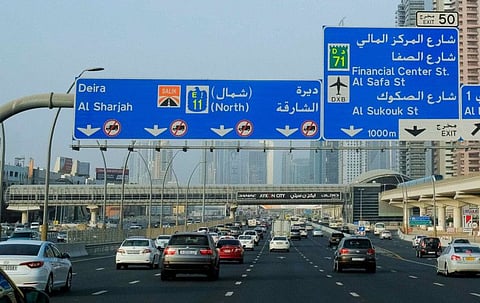Dubai sees a car boom as number of registered vehicles crosses 1.83 million
RTA introduces more smart initiatives to ease vehicle and driver licensing services

Also In This Package
Dubai: Number of registered vehicles in Dubai has increased to 1.83 million this year, compared to 1.4 million in 2015 and 740,000 in 2006.
Also, the number of driver licences has increased to 2.5 million this year, compared to 1.8 million in Dubai.
Roads and Transport Authority (RTA) in Dubai has introduced a number of new smart initiatives to facilitate customers in the wake of increasing number of vehicles and driver licences in the emirate.
Mattar Mohammad Al Tayer, Director-General and Chairman of the Board of Executive Directors of RTA, endorsed a package of smart initiatives for improving and sustaining RTA’s services. Initiatives unveiled contribute to sustaining the use of RTA assets, such as roads and bridges, and improve driver and vehicle licensing services, which will improve the quality of customer services and enhance the training and qualification of drivers, and will translate into improved traffic safety levels, RTA said in a press release on Saturday.
Al Tayer held two separate meetings with CEOs and Directors of Traffic and Roads Agency and the Licensing Agency of RTA to discuss service improvement plans using smart initiatives.
Active driver licences
In a meeting with the Directors of Licensing Agency, Al Tayer reviewed the performance indicators of the agency over the first five months of 2020. It was reported that the number of active driver licences in Dubai amounted to 2.5 million, while the number of registered vehicles reached 1.83 million. The Agency processed 2.447 million transactions comprising 1.6 million vehicle-licensing transactions, 760,000 driver-licensing transactions, and 4,300 no-objection transactions for commercial activities. The numbers reveal that in Dubai, effectively every second person now owns a car. The number of digital transactions processed increased from 59 per cent in December 2019 to 69 per cent in Improved Testing.
Al Tayer viewed a presentation on the driver-testing vehicle deployed as part of the smart route system; a futuristic project based on the use of information telecommunication technology (ITT) in vehicles. Such vehicles are fitted with smart sensors and Geographic Information System (GIS), enabling them to monitor driver licence trainees during on-road tests. The project has the potential to improve traffic safety and the quality of drivers licensing service besides enhancing the implementation of governance and transparency in tests and automating the entire process.
Smart driving lessons
The project employs numerous advanced technologies such as artificial intelligence, internet of things, advanced co-driver assisting systems, GIS, face-recognition technology and 3D panoramic imaging.
The system was installed in 250 vehicles, which carried out 43,828 tests at 16 driving institutes during the first quarter of this year. The project reduced the time of retrieving records by as much as 75 per cent, cut accident-reporting time by 75 per cent as well, and saved the printing of 60,000 papers.
Digital journey
Al Tayer was briefed about the system for booking dates for vehicle licensing and testing through Dubai Drive app. He was also apprised about the vehicle safety service that enables subscribers to rate the performance of companies, drivers, geographic tracking and vehicle information.
Drones for road inspections
In a separate meeting last week, Al Tayer also reviewed an initiative for the deployment of drones in monitoring maintenance works, which was used in inspecting the structural components of pedestrian bridges across the Dubai Water Canal and elevated structures. Inspection by drones cuts short the time and cost of assessing constructional elements and enables the inspection of hard-to-reach areas of installations, such as suspension cables and bridge bearings.
Future for technology
Al Tayer stressed on the need to broaden the scope of smart transformation across RTA operations such that all customer transactions can be processed without seeking the support of employees of service centres. He called for the use of artificial intelligence, big data and blockchain technologies to improve services to customers and make them happier.
“We have to benefit from RTA’s experience of providing customer services during the lockdown [movement restrictions] for the COVID-19 pandemic, identify the points of strengths and develop solutions to issues encountered in the processing of certain transactions. We need to step up RTA’s preparedness to emergencies and adopt advanced technology practises to meet the present needs and cope with future challenges,” he added.
Sign up for the Daily Briefing
Get the latest news and updates straight to your inbox









